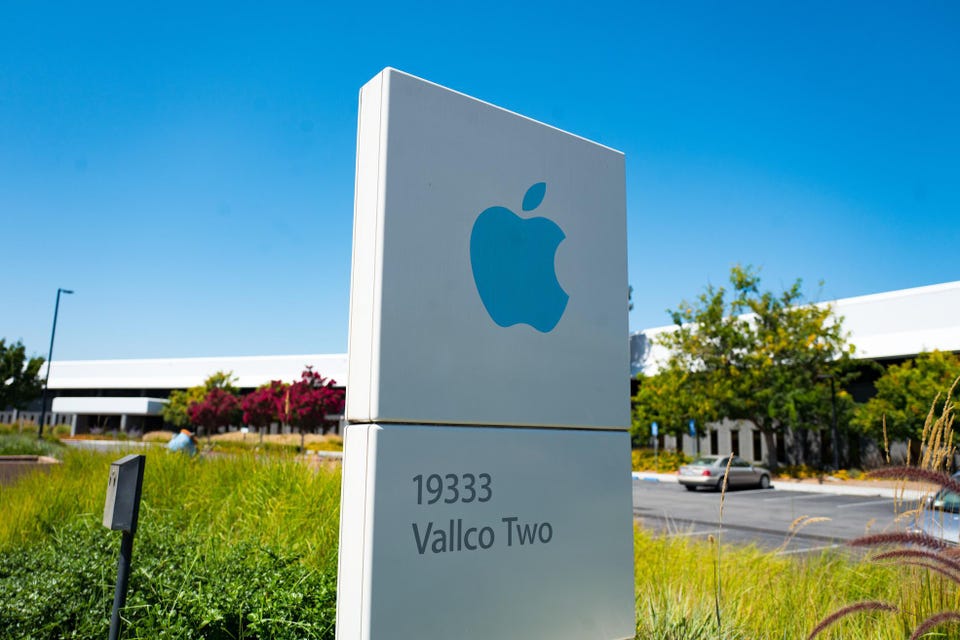Retail Apple Can’t Turn Back From Flexible Work-From-Home Options Matthew Stern Contributor RetailWire Contributor Group Opinions expressed by Forbes Contributors are their own. Aug 30, 2022, 12:00pm EDT | Share to Facebook Share to Twitter Share to Linkedin Apple AAPL has ordered its employees back to the office, and many are not happy about it. A group of employees are circulating an internal petition arguing that the flexible work-from-home policy in effect for the past few years is resulting in “exceptional work,” according to Gizmodo (reporting on news originally appearing in Financial Times ).
The petition came about as a reaction to CEO Tim Cook’s recent announcement that Apple employees must appear in person in the office at least three days a week, effective September 5. The petitioners argue that such a blanket demand fails to account for those who work more effectively from home full time or with flexible schedules. In an online discussion last week , a number of the experts on the RetailWire BrainTrust reflected on their own long-time work-from-home careers to analyze where Apple might be going wrong.
“I have worked from home for 15 years,” wrote Paula Rosenblum , founder of RSR Research. “I never felt like we missed out on anything, and I truly believe that it’s very misguided to force people to waste a couple hours of their lives commuting to an office, which most likely has open seating to boot. Give me my privacy.
” Low-angle view of blue colored sign with logo and buildings near the headquarters of Apple Computers . . .
[+] in the Silicon Valley, Cupertino, California, August 26, 2018. (Photo by Smith Collection/Gado/Getty Images) Getty Images “You can’t give people something, then take it away and hope for the best,” wrote Ryan Mathews , CEO of Black Monk Consulting. “All other things being more or less equal, the more flexible the work schedule, the potentially more attractive the job.
Apple’s mistake is confusing a cultural issue with a condition of employment. It seems to me — and I’ve worked on a remote or ‘mobile’ schedule for the majority of my career — that some people do, in fact, perform better out of an office. Others need the structure, the social contact, and — yes — the politics.
” MORE FOR YOU ‘No Christmas Trees, No Christmas Trees’ Another Shortage May Be On The Way The Grocery Business Is Going To Get Much More Competitive Costco Addresses Supply Chain Pains By Chartering Their Own Ships A poll by Advanced Workplace Associates in February found that only three percent of white collar workers wanted to return to working in the office full time, Fortune reports . Eighty-six percent reported wanting to work from home at least two days a week. Others on RetailWire’s BrainTrust agreed that remaining open to flexible work from home policies would confer advantages to businesses in the future, including Apple.
“Yes, flexible work policies will give companies an edge with recruiting and retention,” wrote Lisa Goller , content marketing strategist. “While face-to-face collaboration enlivens some workers, others flourish with privacy, space and few disruptions… Apple should listen to workers’ concerns, and monitor any changes in performance, productivity and morale. ” “My expectation is most white-collar positions will be easier to fill if the company offers a hybrid schedule and that will result in better retention rates,” wrote Steve Montgomery , president of B2B Solutions.
But others saw murky concerns in a full-time WFH approach. “This issue is far trickier than we’d like,” wrote Doug Garnett , president of Protonik. “First, the claim of unprecedented effectiveness by allowing WFH would be impossible to measure.
Second, it could be a leverage point for troublemakers. But also, a broad rigid policy is not an effective response. This is a situational issue.
Each company must make its own way in establishing a policy and approach to WFH which is effective in their unique situation. ” And some saw the issue as being uniquely complicated for Apple. “Apple spent billions of dollars to create a city within a city working environment based on the needs of the associates,” wrote Richard Hernandez , director of Main Street Markets.
In the months leading up to the announcement of the current strategy, Mr. Cook admitted to not having all the answers on how best to manage the transition. In June, Mr.
Cook referred to the initiative to return to the office as “the mother of all experiments,” according to Apple Insider . He expressed a preference for in-office work because of the “serendipity” he believes occurs in workplace meetings, although he said that Zoom meetings were not inferior to in-person ones, simply different. For Mr.
Mathews, the employee blowback revealed a misstep in the experiment that the tech company should move fast to remedy, and he had a few suggestions how. “Once Apple (involuntarily) sent folks home, they should have understood that a significant percentage of them wouldn’t want to come back to the office, at least on a full-time basis,” wrote Mr. Mathews.
“Clearly they didn’t, and that’s why what should have been settled by a flexible HR policy now looks like a corporate insurrection. Apple should defuse, reconsider, establish KPIs for remote workers and make coming to work more advantageous than staying home. Not really the biggest problem they’ll face, but clearly badly mishandled.
” Follow me on Twitter . Matthew Stern Editorial Standards Print Reprints & Permissions.
From: forbes
URL: https://www.forbes.com/sites/retailwire/2022/08/30/apple-cant-turn-back-from-flexible-work-from-home-options/



